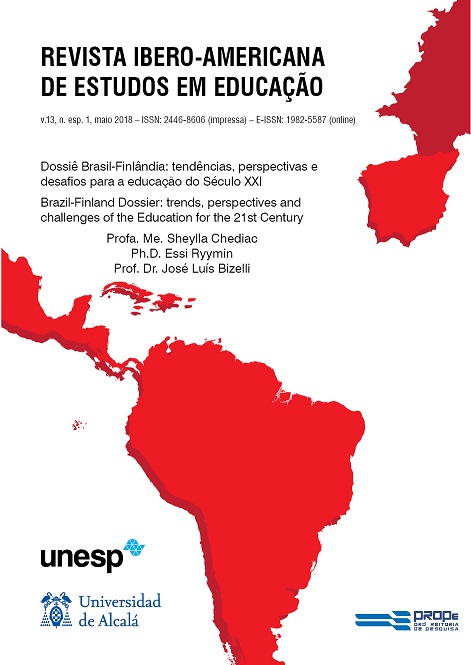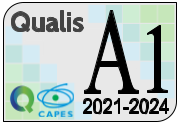O uso de dispositivos móveis na sala de aula: pedagogia de projetos e tecnologias móveis na educação superior
DOI:
https://doi.org/10.21723/riaee.nesp1.v13.2018.10047Palavras-chave:
Educação superior, Tecnologias móveis, Pedagogia de projetos, Processo de ensino e aprendizagem.Resumo
O presente estudo relata resultados parciais da pesquisa intitulada “Pedagogia de Projetos e as Tecnologias Móveis: Potencialidades e Desafios aos Processos de Ensino e de Aprendizagem no Curso Superior de Marketing”, desenvolvida no âmbito do Programa de Pós-Graduação em Educação na Universidade do Oeste Paulista (UNOESTE/Presidente Prudente/SP/Brasil). Esta investigação adotou como objetivo geral analisar como as tecnologias móveis podem ser articuladas ao desenvolvimento de projetos de trabalho, visando à sua integração às práticas pedagógicas no ensino superior. A investigação se desenvolveu embasada na abordagem qualitativa e foi realizada sob a forma de pesquisa-intervenção. Os dados foram coletados por meio da observação participante, entrevista semiestruturada, questionário e grupo focal. Como contexto, adotou-se a realidade do curso superior de Marketing, ofertado por uma IES da rede privada, situada no município de Lins/SP/Brasil. Os resultados alcançados propiciaram a compreensão do perfil dos estudantes de ensino superior na era contemporânea e a necessidade de (re)construção das práticas pedagógicas diante desse alunado. Evidenciou-se ainda a importância dos projetos de trabalho como uma oportunidade de adotar uma metodologia ativa articulada às tecnologias móveis no ensino superior.
Downloads
Referências
BALC, A.; BOZKURT, S. Job expectations of Generation X and Y Teachers in Turkey. World Applied Sciences Journal, v. 21, n. 4, p. 599-614. 2013.
CAVALCANTI NETO, A. L. G.; AQUINO, J. de L. F. The evaluation of learning as a love act: what the teacher practices? Education in Journal, Belo Horizonte, v. 25, n. 2, p. 223-240, aug. 2009.
CERBASI, G.; BARBOSA, C. More Time More Money: Strategies for a More Balanced Life. 1. ed. Rio de Janeiro: Thomas Nelson Brasil, 2009.
CIRÍACO, D. What is Stop Motion? World Tec. 2009. Available at: https://www.tecmundo.com.br/player-de-video/2247-oque-e-stop-motion-.htm. Access in: 13 mar. 2016.
CLARO, J. A. C. et al. Youthful lifestyle of "Generation Y" and their perspectives of career, income and consumption. In: Seminars in Administation - SEMEAD. 2010. São Paulo. Anais... São Paulo: FEA/USP, 2010.
COMAZZETTO, L. R. et al. The Generation Y in the Labor Market: A Comparative Study Between Generations. Psychology: science and profession, Brasília, v. 36, n. 1, p. 145-157, mar. 2016.
CORSO, K.B.; FREITAS, H. M. R. de.; BEHR, A. The Context in Mobile Work: a discussion in the light of the ubiquity paradigm. Journal Management in Dialogue. Program of Post-Graduate Studies in Administration, Pontifical Catholic University of São Paulo, v. 15, n. 2, p. 01-25, may/aug. 2013.
CRAMPTON, S. M.; HODGE, J. W. Generation Y: Unchartered Territory. Journal of Business & Economics Research, v. 7, n. 4, p. 1-6. 2009.
DICECCO, V. Hey! What's the matter with kids today? Or Managing today's cross-generational workforce. 2006. Available at: http: // www. Sgia.org/feature_articles/kids_today_dicecco.htm. Access in: 20 nov. 2013.
FGI. One workplace, four generations: Managing their conflicting needs. Working Well for Managers, n. 7. 2006. Available at: http://www.mta.ca/hr/managers/workingwell_sept2004.pdf#search=%22Working%20for%20managers%20One%20workplace%2C%20Four%20generations%20FGI%22. Access in: 20 nov. 2013.
FONSECA, M. 5 Ways to Conquer Your Customers by Cell Phone. 2015. Available at: http://exame.abril.com.br/pme/5-maneiras-de-conquistar-seus-clientes-pelo-celular/. Access in: 03 jul. 2017.
HOWE, N.; STRAUSS, W. Generations: The History of America's Future, 1584 to 2069. 1. ed. New York: Morrow, 1991.
MEDEIROS, Z.; VENTURA P. C. S. The concept of technological culture and a study in the educational environment. Ensaio Pesquisa em Educação em Ciência, Belo Horizonte, v. 9, n. 2, p. 272-289, dec. 2007.
MITCHELL, S. How to Talk to Young Adults. American Demographics, v. 15, n. 4, p. 50-54. 1993.
MITRE, S. M. et al. Active teaching-learning methodologies in health professional training: current debates. Science and collective health, Rio de Janeiro, v. 13, suppl. 2, p. 2133-2144, dec. 2008.
NETO, E. S.; FRANCO, E. S. Teachers and the pedagogical challenges facing the new generations: considerations about the present and the future. Journal of Education COGEIME, v. 19, n. 36, p. 9-25. 2010.
OLIVEIRA, P. Mobile Marketing will be imperative in 2017. World of Marketing. Notebook Market. Available at: https://www.mundodomarketing.com.br/reportagens/mercado/37064/mobile-marketing-sera-imperativo-em-2017.html?utm_source=akna&utm_medium=email&utm_%20campaign=news+10.01.17. Access in: 11 jan. 2017.
ROESLER, J. Communication, Society and Online Education. 2008. 199f. Thesis (Doctorate in Social Communication) - Pontifical Catholic University of Rio Grande do Sul, RS, 2008.
SANTAELLA, L. Ubiquitous communication: repercussions on culture and education. São Paulo: Paulus, 2013.
SIMÕES, L.; GOUVEIA, L. Targeting the Millennial Generation. III Jornada de Publicidade e Comunicação. Advertising for the consumer of the 21st century. Porto: Fernando Pessoa University (UFP), April 10, 2008.
TERÇARIOL, A. A. L. A challenge in the training of educators: the experience and development of human values using technologies. 2003. 313f. Dissertation (Master in Education) – Paulista State University, Faculty of Science and Technology, Presidente Prudente, SP, 2003.
UNESCO. UNESCO policy guidelines for mobile learning. Published by the United Nations Educational, Scientific and Cultural Organization. Paris, France, v. 1, n. 1, feb. 2013. Available at: http://unesdoc.unesco.org/images/0021/002196/ 219641E.pdf. Access in: 15 apr. 2014.
WOODRUFF, C. Generation Y. Training Journal. Ely: Jul, 2009, p. 31-35.
Downloads
Publicado
Como Citar
Edição
Seção
Licença
Manuscritos aceitos e publicados são de propriedade dos autores com gestão da Ibero-American Journal of Studies in Education. É proibida a submissão total ou parcial do manuscrito a qualquer outro periódico. A responsabilidade pelo conteúdo dos artigos é exclusiva dos autores. A tradução para outro idioma é proibida sem a permissão por escrito do Editor ouvido pelo Comitê Editorial Científico.








